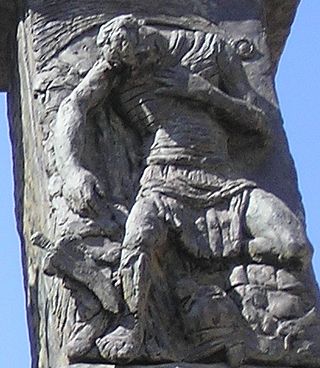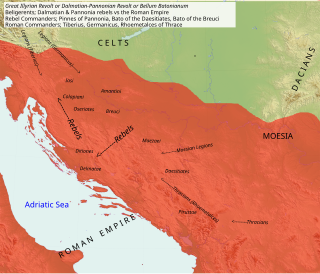Related Research Articles

Boudica or Boudicca was a queen of the ancient British Iceni tribe, who led a failed uprising against the conquering forces of the Roman Empire in AD 60 or 61. She is considered a British national heroine and a symbol of the struggle for justice and independence.
This article concerns the period 79 BC – 70 BC.
Year 75 BC was a year of the pre-Julian Roman calendar. At the time it was known as the Year of the Consulship of Octavius and Cotta. The denomination 75 BC for this year has been used since the early medieval period, when the Anno Domini calendar era became the prevalent method in Europe for naming years.
Year 121 BC was a year of the pre-Julian Roman calendar. At the time it was known as the Year of the Consulship of Opimius and Allobrogicus and the Second Year of Yuanshou. The denomination 121 BC for this year has been used since the early medieval period, when the Anno Domini calendar era became the prevalent method in Europe for naming years.
Year 154 BC was a year of the pre-Julian Roman calendar. At the time it was known as the Year of the Consulship of Opimius and Albinus/Glabrio. The denomination 154 BC for this year has been used since the early medieval period, when the Anno Domini calendar era became the prevalent method in Europe for naming years.

The First Servile War of 135–132 BC was a slave rebellion against the Roman Republic, which took place in Sicily. The revolt started in 135 when Eunus, a slave from Syria who claimed to be a prophet, captured the city of Enna in the middle of the island with 400 fellow slaves. Soon after, Cleon, a Cilician slave, stormed the city of Agrigentum on the southern coast, slaughtered the population, and then joined Eunus' army and became his military commander. Eunus even proclaimed himself king, under the name of Antiochus, after the Seleucid emperors of his native Syria.
Quintus Fulvius Flaccus, son of Marcus Fulvius Flaccus, was consul in 237 BC, fighting the Gauls in northern Italy. He was censor in 231 BC, and again consul in 224 BC, when he subdued the Boii. He was a praetor in 215 BC and in 213 BC Master of Horse in the dictatorship of Gaius Claudius Centho.
Lucius Opimius was a Roman politician who held the consulship in 121 BC, in which capacity and year he ordered the execution of 3,000 supporters of popular leader Gaius Gracchus without trial, using as pretext the state of emergency declared after Gracchus's recent and turbulent death. He was censured in 116 BC by a tribunal investigating illicit bribes taken from Jugurtha, king of Numidia, by his commission tasked with dividing territory between the king and his brother. He then left Rome to Dyrrhachium in exile where he later died.

Gaius Sempronius Gracchus was a reformist Roman politician and soldier who lived during the 2nd century BC. He is most famous for his tribunate for the years 123 and 122 BC, in which he proposed a wide set of laws, including laws to establish colonies outside of Italy, engage in further land reform, reform the judicial system and system for provincial assignments, and create a subsidised grain supply for Rome.

The Bar Kokhba revolt was a large-scale armed rebellion initiated by the Jews of Judea, led by Simon bar Kokhba, against the Roman Empire in 132 CE. Lasting until 135 or early 136, it was the third and final escalation of the Jewish–Roman wars. Like the First Jewish–Roman War and the Second Jewish–Roman War, the Bar Kokhba revolt resulted in a total Jewish defeat; Bar Kokhba himself was killed by Roman troops at Betar in 135 and the Jewish rebels who remained after his death were all killed or enslaved within the next year.

The senatus consultum ultimum is the modern term given to resolutions of the Roman Senate lending its moral support for magistrates to use the full extent of their powers and ignore the laws to safeguard the state.
The Deciates (Δεκιήταις) were a Ligurian tribe dwelling near on the Mediterranean coast, around present-day Antibes, during the Iron Age and the Roman era.
The Oxybii or Oxubii were a Celto-Ligurian tribe dwelling on the Mediterranean coast during the Iron Age and the Roman period.

Fregellae was an ancient town of Latium adiectum, situated on the Via Latina between Aquinum and Frusino, in central Italy, near the left branch of the Liris.

The Bellum Batonianum was a military conflict fought in the Roman province of Illyricum in the 1st century AD, in which an alliance of native peoples of the two regions of Illyricum, Dalmatia and Pannonia, revolted against the Romans. The rebellion began among native peoples who had been recruited as auxiliary troops for the Roman army. They were led by Bato the Daesitiate, a chieftain of the Daesitiatae in the central part of present-day Bosnia and Herzegovina, and were later joined by the Breuci, a tribe in Pannonia led by Bato the Breucian. Many other tribes in Illyria also joined the revolt.
The siege of Thala, part of the Jugurthine War, was an invasion of the Numidian town of Thala by a Roman army. The Romans were commanded by the proconsul Quintus Caecilius Metellus, the Thalans by an unknown Numidian commander. The Romans' main objective was to capture the Numidian king Jugurtha who was reported to be in Thala, but he escaped before the legions reached the fortress town. Metellus then besieged the town to get hold of one of Jugurtha's treasuries which was stored in Thala. The fortress town was besieged for forty days after which most of its inhabitants committed suicide by setting fire to the town.
The gens Decia was a plebeian family of high antiquity, which became illustrious in Roman history by the example of its members sacrificing themselves for the preservation of their country. The first of the family known to history was Marcus Decius, chosen as a representative of the plebeians during the secession of 495 BC.

The gens Opimia, also written Opeimia on coins, was a plebeian family at ancient Rome. Members of this gens are first mentioned during the time of the Samnite Wars, and they are mentioned in Roman historians from then down to the end of the Republic. The first of the Opimii to obtain the consulship was Quintus Opimius in 154 BC.
References
- ↑ Conole, P. (1981). "Allied Disaffection and the Revolt of Fregellae1". Antichthon. 15: 129–140. doi:10.1017/S0066477400004615. ISSN 0066-4774.